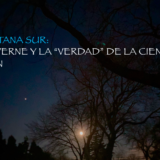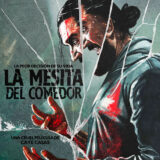The Guardians’s Stephen Kelly recently wrote a review of Star Trek: Picard that reminded me of a debate I’ve been having intermittently, both with myself and with a handful of other SF Fans.
A line in that review reinforced the words and thoughts I just recently picked up from the introduction to a 1960s anthology – Prelude to Analog – edited by John W. Campbell, the recently disgraced and former scion of “modern Science Fiction”.
Kelly’s words were these:
“It is this, more than anything else, that is fundamentally lacking from modern Star Trek: a sense of tonal texture, a spirit of curiosity about different worlds and cultures, and the crackling chemistry of a warm and interesting crew.”
Campbell’s words, in summation, make it clear that so far as he was concerned (so far as the most influential voice in science fiction of a time was concerned), the genre’s purpose was to illustrate where our science and technologies might take us in the future.
“One thing the turmoils of the Great Depression had left was a considerably deeper realization that things could change…and very likely would.”
“And by 1938, it was quite clear that science was going to make that future.”
“The high school and college students of 1940…the people who, as students, got some glimpse of the direction of the future through science fiction. And became the scientists who helped make that future.”
“Science Fiction is, very strictly and literally, analogous to science facts. It is a convenient analog system for thinking about new scientific, social and economic ideas…”
***
While I dislike bringing up Campbell as a source these days, he was the founder and champion of an extremely influential school of thought on what science fiction was and what its purpose should be. He took Gernsback’s definition (sugar coating the science in order to make enthusiastic amateur scientists out of everyone) and morphed it into a near scientific discipline, generally referred to by its practitioners as the Gedanken Experiment – the Thought Experiment.
This concept of the purpose of the genre prevailed within the field from Campbell’s ascension as editor of Astounding through at least the early 1980s; it even survived the New Wave assault (take Camp Concentration by Disch by way of example).
Campbell says of this concept
“Science Fiction can be taken–read–as a form of escape. But it is, also, a way of considering the past, present and future from a different viewpoint, and taking a look at how else we might do things.”
“A literature predicting changes-to-come no longer had quite so much automatic implication of apocalypse. The future could not only be different–but better.”
(emphasis mine)
and, no special emphasis needed:
“The business of science fiction is to predict the probable trends of the future…”
A notion that many these days are attempting to displace with a different concept: that the genre’s purpose is to serve as a reflection upon our own times, to offer us insight we might not otherwise glean by way of distancing its subjects, representing them in forms that do not distort our engagement with prejudice and bigotry.
This new purpose of definition is almost always accompanied by a dismissal of the idea that science fiction is a predictive literature. The thought experiment concept is almost never attacked – is rarely even mentioned – likely because it is easy to gin up examples of SF’s predictive failures, and also – probably mostly – because world building (an essential tool for all good science fiction) is thought experiment. Remove that and you’ve no science fiction.
Which then of these two concepts of the purpose of the literature is the correct one? They are obviously oppositional; the former essentially states that the purpose of this literature is to peer into the future and illustrate how things could be made better (or, taking a cue from Bradbury, how we can avoid making things worse); the latter wants us to naval-gaze, to take no hand in shaping our future but, instead, wallow in all of the mistakes we’ve already made, to turn inwards instead of looking outwards.
Let me dismiss this idea that SF is not predictive, as it is an argument made entirely of straw, and demonstrably so through the words of some of its most revered practitioners. Watch this PBS short –
Sure, there were a few hits, but a lot of misses, the detractors say. Take the whole of the genre and you end up with a vanishingly small number of “accurate” “predictions”.
But that’s looking at things from a deliberately negative point of view, one designed to undermine the central concept of the genre.
It is entirely possible to look at things from a positive viewpoint, as the video does. Celebrate the hits and ignore the misses.
But even that argument misses the point. The real point is, the practitioners of the art themselves believed that one vitally important component of what they were about was modelling ways in which the future might develop. Without the central concept that things in the future will be different, there’s no point in writing anything other than westerns and historical romances.
You can’t divorce the genre from its predictive nature; introducing any scientific concept or technological advance that is not currently at hand it itself “predictive”. It may be a bad prediction; it may be based on a flawed understanding of our current technology or fail to take into account other external factors that would mitigate against development along a particular trend, but it is predictive at least in the sense that the assumption is made that such a thing exists in one of our possible futures.
On the other hand, approaching the genre from the position that it is merely “reflective of our times” does not have to engage in prediction; it can, instead, substitute “things are the same, just different” in place of any real thought experiment about the extrapolation of where things are now to how they might develop in the future.
***
Star Trek: Picard, offers us a Federation that is painfully, obviously, an analog for the state of world affairs of the moment: corrupt, infiltrated by inimical powers, ignorant of its past idealism, attempting to obtain security at the expense of freedom and failing.
But do we learn anything from this? Do we gain any insight into how to prevent such things from happening or how to correct the path? No. We’re simply reminded of how awful things have become, of how much that which we took for granted has been taken away from us and we’re reminded of how easily good people go bad when they are panicked and fearful.
This is not science fiction, it’s just more torture porn. We’re all Alex, straightjacketed into a theater chair, forced to watch an endless stream of violence and hate, powerless to look away. Like Alex undergoing the Ludovenko treatment, our free will is being taken from us, forcing us down a path to a recursive future that’s more of the same: bad shit happens and bad shit is going to happen in the future, just as it did in the past.
Even if you do not accept the idea that science fiction is predictive of possible futures, you certainly do accept the fact that – at least in our past – young readers of science fiction were inspired by its visions, grew up, became scientists and engineers and then set about turning those visions into some real-world analog, imbued with the belief that they were improving the world and the human condition. The evidence, in the form of computers, the internet, robotics, medical devices, the space program, military tech, clothing, even food and agriculture, is all around us.
What then are today’s young readers of science fiction going to be inspired to create in their future, if, instead of looking outwards and encouraged to believe that things can be made to be better, our science fiction restricts itself to the pedestrian task of reminding us of how awful and terrible we can be to one another?











I look to a bright future, but since the 1960s, I haven’t found it in “science fiction present,” so I started collecting old 1950s and earlier issues of Astounding, Galaxy, F&SF to find that bright future in “science fiction past”! And, to make matters worse, from a PC thought control perspective, I even turned to finding recordings of the 1950s live-broadcast TV interplanetary adventure shows CAPTAIN VIDEO, SPACE PATROL, TOM CORBETT SPACE CADET, and even the pariah ROD BROWN of the ROCKET RANGERS! Captain Video and the Video Ranger, Commander Buzz Corry and Cadet Happy, Tom Corbett, Roger Manning, and Cadet Astro, Rod Brown complimented the older writings of Jack Williamson, Robert Heinlein, Isaac Asimov to re-connect me with that “sense of wonder” I had with my first encounters with science fiction. Even the old dystopias had more “sense of wonder” than today’s utopias infused with PC thought control. George Orwell sure was right, and “science fiction present” has proven him right. From that standpoint, the bright future we can expect from those writers is a vision of a jack-boot stopping on a human face…forevermore.